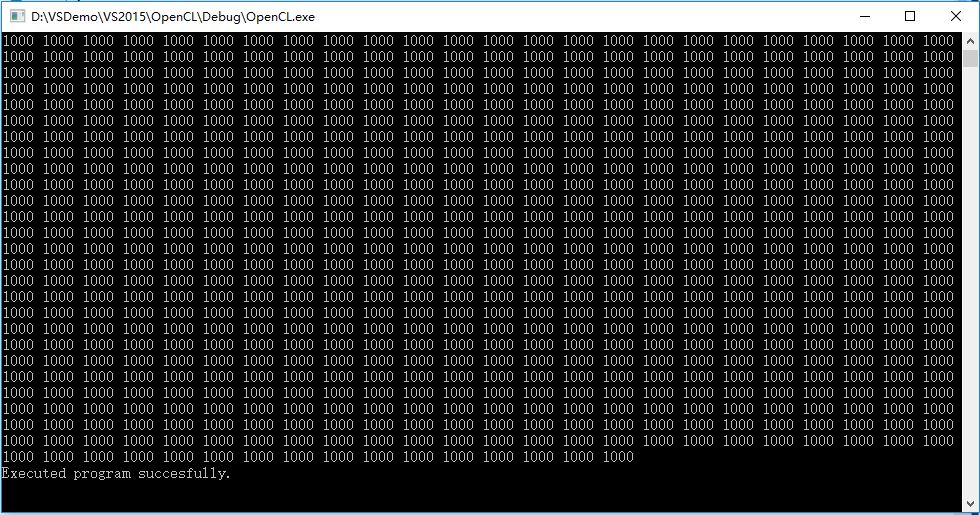1. 选择OpenCL平台并创建一个上下文
平台(Platform)是指主机和OpenCL管理框架下的若干个设备构成的可以运行OpenCL程序的完整硬件系统,这个是跑OpenCL程序的基础,所以第一步要选择一个可用的OpenCL品台。一台机器上可以有不止一个这样的品台,一个平台也可以有不止一个GPU。
主要涉及的函数: clGetPlatformIDs() ,用于获取可用的平台;
clCreateContextFromType(), 创建一个OpenCL运行时山下文环境;
2. 选择设备并创建命令队列
选择平台并创建好OpenCL上下文环境之后,要做的事选择运行时用到的设备,还要创建一个命令队列,命令队列里定义了设备要完成的操作,以及各个操作的运行次序。
主要涉及的函数:clCreateCommandQueue(),用于创建一个指定设备上的上下文环境,第二个参数定义了选择的设备。
3. 创建和构建程序对象
程序对象用来存储与上下文相关联的设备的已编译可执行代码,同时也完成内核源代码的加载编译工作。
主要涉及的函数:clCreateProgramWithSource(), 这个函数会创建一个程序对象,在创建的同时,把已经转化成字符串形式的内核源代码加载到该程序对象中。
clBuildProgram()用于编译指定程序对象中的内核源代码,编译成功之后,再把编译代码存储在程序对象中。
4. 创建内核和内存对象
要执行程序对象中的已编译成功的内核运算,需要在内存中创建内核并分配内核函数的参数,在GPU上定义内存对象并分配存储空间。
主要涉及的函数:clCreateKernel(), 创建内核;
clCreateBuffer(),分配内存对象的存储空间,这些对象可以由内核函数直接访问。
5. 设置内核数据并执行内核
创建内核和内存对象之后,接下来要设置核函数的数据,并将要执行的内核排队。
主要涉及的函数:clEnqueueNDRangeKernel(),用于设置内核函数的所有参与运算的数据。 利用命令队列对要在设备上执行的内核排队。需要注意的是,执行内核排队之后并不意味着这个内核一定会立即执行,只是排队到了执行队列中。
6. 读取执行结果并释放OpenCL资源
内核执行完成之后,需要把数据从GPU拷贝到CPU中,供主机进一步处理,所有者写工作完成之后需要释放所有的OpenCL资源。
主要涉及的函数:clEnqueueReadBuffer(),读取设备内存数据到主机内存;
clReleaseXXX(),释放OpenCL资源。
以下程序包含了以上所有6个步骤,功能很简单,实现两个数组求和。
主程序:
- #include <iostream>
- #include <fstream>
- #include <sstream>
- #include <CL/cl.h>
- const int ARRAY_SIZE = 1000;
- //一、 选择OpenCL平台并创建一个上下文
- cl_context CreateContext()
- {
- cl_int errNum;
- cl_uint numPlatforms;
- cl_platform_id firstPlatformId;
- cl_context context = NULL;
- //选择可用的平台中的第一个
- errNum = clGetPlatformIDs(1, &firstPlatformId, &numPlatforms);
- if (errNum != CL_SUCCESS || numPlatforms <= 0)
- {
- std::cerr << "Failed to find any OpenCL platforms." << std::endl;
- return NULL;
- }
- //创建一个OpenCL上下文环境
- cl_context_properties contextProperties[] =
- {
- CL_CONTEXT_PLATFORM,
- (cl_context_properties)firstPlatformId,
- 0
- };
- context = clCreateContextFromType(contextProperties, CL_DEVICE_TYPE_GPU,
- NULL, NULL, &errNum);
- return context;
- }
- //二、 创建设备并创建命令队列
- cl_command_queue CreateCommandQueue(cl_context context, cl_device_id *device)
- {
- cl_int errNum;
- cl_device_id *devices;
- cl_command_queue commandQueue = NULL;
- size_t deviceBufferSize = -1;
- // 获取设备缓冲区大小
- errNum = clGetContextInfo(context, CL_CONTEXT_DEVICES, 0, NULL, &deviceBufferSize);
- if (deviceBufferSize <= 0)
- {
- std::cerr << "No devices available.";
- return NULL;
- }
- // 为设备分配缓存空间
- devices = new cl_device_id[deviceBufferSize / sizeof(cl_device_id)];
- errNum = clGetContextInfo(context, CL_CONTEXT_DEVICES, deviceBufferSize, devices, NULL);
- //选取可用设备中的第一个
- commandQueue = clCreateCommandQueue(context, devices[0], 0, NULL);
- *device = devices[0];
- delete[] devices;
- return commandQueue;
- }
- // 三、创建和构建程序对象
- cl_program CreateProgram(cl_context context, cl_device_id device, const char* fileName)
- {
- cl_int errNum;
- cl_program program;
- std::ifstream kernelFile(fileName, std::ios::in);
- if (!kernelFile.is_open())
- {
- std::cerr << "Failed to open file for reading: " << fileName << std::endl;
- return NULL;
- }
- std::ostringstream oss;
- oss << kernelFile.rdbuf();
- std::string srcStdStr = oss.str();
- const char *srcStr = srcStdStr.c_str();
- program = clCreateProgramWithSource(context, 1,
- (const char**)&srcStr,
- NULL, NULL);
- errNum = clBuildProgram(program, 0, NULL, NULL, NULL, NULL);
- return program;
- }
- //创建和构建程序对象
- bool CreateMemObjects(cl_context context, cl_mem memObjects[3],
- float *a, float *b)
- {
- memObjects[0] = clCreateBuffer(context, CL_MEM_READ_ONLY | CL_MEM_COPY_HOST_PTR,
- sizeof(float) * ARRAY_SIZE, a, NULL);
- memObjects[1] = clCreateBuffer(context, CL_MEM_READ_ONLY | CL_MEM_COPY_HOST_PTR,
- sizeof(float) * ARRAY_SIZE, b, NULL);
- memObjects[2] = clCreateBuffer(context, CL_MEM_READ_WRITE,
- sizeof(float) * ARRAY_SIZE, NULL, NULL);
- return true;
- }
- // 释放OpenCL资源
- void Cleanup(cl_context context, cl_command_queue commandQueue,
- cl_program program, cl_kernel kernel, cl_mem memObjects[3])
- {
- for (int i = 0; i < 3; i++)
- {
- if (memObjects[i] != 0)
- clReleaseMemObject(memObjects[i]);
- }
- if (commandQueue != 0)
- clReleaseCommandQueue(commandQueue);
- if (kernel != 0)
- clReleaseKernel(kernel);
- if (program != 0)
- clReleaseProgram(program);
- if (context != 0)
- clReleaseContext(context);
- }
- int main(int argc, char** argv)
- {
- cl_context context = 0;
- cl_command_queue commandQueue = 0;
- cl_program program = 0;
- cl_device_id device = 0;
- cl_kernel kernel = 0;
- cl_mem memObjects[3] = { 0, 0, 0 };
- cl_int errNum;
- // 一、选择OpenCL平台并创建一个上下文
- context = CreateContext();
- // 二、 创建设备并创建命令队列
- commandQueue = CreateCommandQueue(context, &device);
- //创建和构建程序对象
- program = CreateProgram(context, device, "HelloWorld.cl");
- // 四、 创建OpenCL内核并分配内存空间
- kernel = clCreateKernel(program, "hello_kernel", NULL);
- //创建要处理的数据
- float result[ARRAY_SIZE];
- float a[ARRAY_SIZE];
- float b[ARRAY_SIZE];
- for (int i = 0; i < ARRAY_SIZE; i++)
- {
- a[i] = (float)i;
- b[i] = (float)(ARRAY_SIZE - i);
- }
- //创建内存对象
- if (!CreateMemObjects(context, memObjects, a, b))
- {
- Cleanup(context, commandQueue, program, kernel, memObjects);
- return 1;
- }
- // 五、 设置内核数据并执行内核
- errNum = clSetKernelArg(kernel, 0, sizeof(cl_mem), &memObjects[0]);
- errNum |= clSetKernelArg(kernel, 1, sizeof(cl_mem), &memObjects[1]);
- errNum |= clSetKernelArg(kernel, 2, sizeof(cl_mem), &memObjects[2]);
- size_t globalWorkSize[1] = { ARRAY_SIZE };
- size_t localWorkSize[1] = { 1 };
- errNum = clEnqueueNDRangeKernel(commandQueue, kernel, 1, NULL,
- globalWorkSize, localWorkSize,
- 0, NULL, NULL);
- // 六、 读取执行结果并释放OpenCL资源
- errNum = clEnqueueReadBuffer(commandQueue, memObjects[2], CL_TRUE,
- 0, ARRAY_SIZE * sizeof(float), result,
- 0, NULL, NULL);
- for (int i = 0; i < ARRAY_SIZE; i++)
- {
- std::cout << result[i] << " ";
- }
- std::cout << std::endl;
- std::cout << "Executed program succesfully." << std::endl;
- getchar();
- Cleanup(context, commandQueue, program, kernel, memObjects);
- return 0;
- }
核函数文件“HelloWorld.cl”:
- __kernel void hello_kernel(__global const float *a,
- __global const float *b,
- __global float *result)
- {
- int gid = get_global_id(0);
- result[gid] = a[gid] + b[gid];
- }
执行结果:
